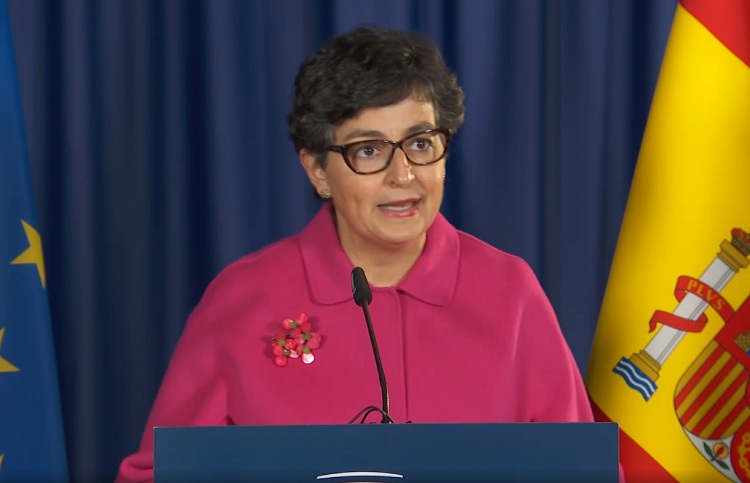Luis Ayllón
The Minister of Foreign Affairs, Arancha González Laya, has decided that the post of cultural advisor in Rome will go to the diplomat Carlos Tercero Castro, one of the assistants to the President of the Government, Pedro Sánchez, ahead of other much older diplomats who aspired to the same post, according to The Diplomat, according to reliable sources.
González Laya acceded to a request that came from La Moncloa and to do so, in the call for the provision of jobs abroad, he gave an asterisk to the post of cultural counsellor at the Embassy in Italy, which means that he reserves the right to decide who fills it, without taking into account the opinion of the Board of the Diplomatic Career.
In reality, the final decision on posts abroad always rests with the Minister, but he usually accepts the distribution made by the Diplomatic Career Board after considering the requests made by the applicants in the process known in diplomatic jargon as ‘el Bombo’ and taking into account the professional categories and experience of the applicants.
However, a small number of these posts, which are considered particularly sensitive for Spanish foreign policy, are reserved for direct appointment by the minister, which means they are not included in the distribution proposed by the Board.
The Under-Secretary for Foreign Affairs, Celsa Nuño, has informed the members of the Diplomatic Career Board that the posts which, this year, carry an asterisk are the second posts in the embassies in Paris, Berlin and Rabat, but also the post of cultural counsellor in Rome, something which has surprised the diplomats, since other posts, which could be considered more strategic, such as the Consulate in New York or the Cultural Counsellor’s Office in Havana, have not been reserved.
Furthermore, the Undersecretary has communicated the names of the people who will occupy these posts, and this is where the surprise has arisen, especially in the case of the Cultural Council in Italy, because around ten diplomats aspired to the post, some with extensive professional careers, including Fernando Carderera, former ambassador to France, Israel and Finland, with a forty-year career and the category of minister plenipotentiary of first rank, and Antonio Alvarez Barthe, current ambassador to the Emirates and former ambassador to Gabon, with nearly thirty years of experience.
However, according to the communication made by the undersecretary, the post will be filled by Carlos Tercero, who has the rank of first secretary, with eleven and a half years of career -where he has been posted in Poland and Guatemala and consul general in Bahia Blanca (Argentina)-, and who, since July 2018, has been one of the assistants to the President of the Government at La Moncloa. The head of the Executive usually has two assistants, one normally from the party environment and the other a diplomat, whose tasks consist, among other things of a logistical nature, of carrying the speeches he delivers in public.
The decision, according to sources consulted by The Diplomat, has caused unease among many of the diplomats involved in “el Bombo”, who recall that the post has normally been filled by more veteran diplomats: the latest, Juan María Alzina, former director general of the Office of Diplomatic Information (OID) and former ambassador to Ecuador, or Ion de la Riva, former ambassador to UNESCO and India.
The surprise among diplomats also extends to another of the appointments, that of “number two” for the Embassy in Paris, which will be occupied by David Carriedo.
The unease, in this case, stems from what they consider to be non-compliance with a rule established by the Ministry’s own authorities, according to which diplomats currently at the head of an embassy cannot participate in “el Bombo” until the authorities of the country in which they are stationed have been asked for permission to appoint their replacement.
The rule affects a good number of ambassadors who already know that they will be relieved of their duties in the coming months and who wished to compete for one of the new posts, such as Enrique Ruiz Molero (Canada), Álvaro Iranzo (Saudi Arabia), Manuel Hernández-Ruigomez (Angola), Alicia Rico (Ghana), Fernando ASlonso (Gabon) and Carriedo himself (Kazakhstan).
Given that Foreign Minister Arancha González Laya is considerably late in choosing new ambassadors, those affected by the aforementioned rule have found that their requests for other posts cannot be considered. The unease stems from the fact that while the measure has been applied to the rest, it has not been applied in the case of David Carriedo, an exception which, in the minister’s entourage, is argued by indicating that, as it is marked with an asterisk, it is a free post, and that it has been applied in the case of David Carriedo, an exception which, in the minister’s entourage, is argued by indicating that it is a free post.
The other two appointments -the second posts in Berlin and Rabat- will go to José Luis Rodríguez de Colmenares and Borja Montesino, respectively.






